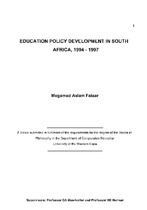| dc.contributor.advisor | Meerkotter, DA | |
| dc.contributor.advisor | Herman, HD | |
| dc.contributor.author | Fataar, Mogamad Aslam | |
| dc.contributor.other | | |
| dc.contributor.other | Faculty of Education | |
| dc.date.accessioned | 2013-06-10T08:43:19Z | |
| dc.date.available | 2007/03/23 08:23 | |
| dc.date.available | 2007/03/23 | |
| dc.date.available | 2013-06-10T08:43:19Z | |
| dc.date.issued | 1999 | |
| dc.identifier.uri | http://hdl.handle.net/11394/1332 | |
| dc.description | Philosophiae Doctor - PhD | en_US |
| dc.description.abstract | Black South Africans have been exposed to an unequal and divided education system. It has been expected that the basis for an equitable education system would be laid in the post apartheid period. In this thesis I have provided an analysis of education policy development in South Africa between May 1994 and mid-1997. My main aim has beento understand the policy vision that the post apartheid state has enacted as the basisfor educational reconstruction.The conceptual framework of this thesis is located in the academic fields of Education and Development and Policy Sociology. I have focused on the interaction between the broad delimitations set by the structural, economic and political dimensions in society on the one hand, and the political and policy dynamics that have given education policy its specific meaning on the other hand. The role of the government in enacting a specific policy vision has been at the centre of my analysis.The government has effected a conservative vision with the adoption of the Growth, Employment and Redistribution (GEAR) macroeconomic strategy. GEAR has targeted the development of an export-based global economy along post fordist lines. Predicated upon an emphasis on fiscal discipline, the dominant policy orientation has supported equity but without an emphasis on redress. This approach has not provided the necessary basis for education reconstruction.
The National Qualifications Framework (NQF) and Outcomes-based education (OBE) embody a definite '/ision in terms of which education policy would be aligned with economic development. This vision is based on the false assumption that education should playa fundamental role in producing the sophisticated labour demands of a globally competitive economy. The logic of both GEAR and the NQF is internally inconsistent and the relationship between these two policy frameworks is unsustainable. | en_US |
| dc.language.iso | en | en_US |
| dc.publisher | University of the Western Cape | en_US |
| dc.subject | Education and state | en_US |
| dc.subject | South Africa | en_US |
| dc.subject | 1994-1997 | en_US |
| dc.subject | Politics and education | en_US |
| dc.subject | South Africa | en_US |
| dc.subject | Education | en_US |
| dc.subject | Curriculum planning | en_US |
| dc.title | Education policy development in South Africa, 1994-1997 | en_US |
| dc.type | Thesis | en_US |
| dc.rights.holder | University of the Western Cape | en_US |
| dc.description.country | South Africa | |

